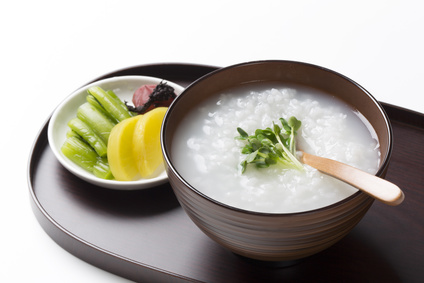
Porridge or Steak?:
Let’s imagine, it is cold and raining outside; and you have just arrived to a big meeting. You spotted some of the participants sneezing, coughing and blowing their noses; and you have a bit of shiver on your back and a slight headache. Now, you fear that you may be coming down with a cold too… You want to go home, get warm, eat a nourishing food and have a good rest. What would you eat then to get yourself to feel stronger…a simple porridge or a lean steak?
Immune Cells’ Patrol at Their Best:
When you are coming down with a cold, what you eat may decide which way you go with the cold, either get better or feel more sick, says Dr. Tei. Some of you may think that a steak can give you the extra stamina you need to sail through this period. However, the better choice would be a simple rice porridge with grated ginger and a pickled plum, Umeboshi in Japanese. Also, something hot and lightly seasoned, such as a chicken soup, would be another great choice. An important thing is that you don’t want to burden your digestive system particularly when you are feeling vulnerable as in the beginning stage of a cold.
Now, scientists know that 60 ~ 70 % of immune cells are in the intestines. So if you burden the intestines with a large quantity of heavy foods, the immune cells will be “glued to” the intestinal walls and won’t be able to support the rest of the body. When viruses are entering the body, you need those immune cells to get out there within the whole body and fight against the viruses. Therefore, when you feel like you are catching a cold, it is more important to eat light, keep the body warm and for you to be well rested. In this way, a parasympathetic (branch of the autonomic) nervous system becomes activated and your immune power goes up…giving you a better chance of feeling better soon.
It is interesting, as the above advice was given in the description of one of the classic Kampo formulae for a beginning stage of a cold, called Keishito or 桂枝湯 (Cinnamon Combination) in one of the classical Kampo texts, called Sho Kan Ron or 傷寒論, which was believed to have been written approximately 2000 years ago.
Happy Digestive Organs – Light Work and Resting:
Many intriguing ideas and insights on healthy living from a Kampo point of view coincide with what has been preached in another extraordinary book called, Yojokun or 養生訓, “Lessons on Nurturing Life”. The author (1630-1714) was a physician for a samurai clan, a botanist and a neo-Confucian philosopher. The book is a compilation of precepts for living life mentally, spiritually and physically to its fullest. In fact, the author completed the book when he was 84 years old based on the collections of his own notes on health and happiness, and how to prevent the onset of disease. Although the author extensively wrote on the mind, emotions, exercises, sexual activities etc., here are some nutritional/eating guidance, which are again surprisingly appropriate even today.
- When it comes to rare or beautifully prepared food, you should stop eating to a point where you are seventy to eighty percent satisfied. Never continue eating until you are full in the stomach.
- Your meals should be light and lightly seasoned. Do not overeat fatty foods and strongly seasoned foods. Never eat raw and cold foods. Limit to one cup of soup, one plate of fish and one or two side dishes.
- Warming foods are good and cooling foods are not.
- Supper should be light and in a smaller portion.
- Do not eat late at night. Going to sleep right after eating is not good. If you do, you will get ill.
- Snacks between meals are not good.
The digestive system benefits from a good rest with some period of no eating (it does not mean extended fasting here). So have a think how you can give your hard working digestive organs a good rest in your eating life. This plays a big role in maintaining your health throughout your life – Nurturing Life!
Keisetsu Otsuka, Sho Kan Ron Commentary (original in Japanese), Sogen Sha 1966.
Ekiken Kaibara, Yojokun (original in Japanese); translated into modern Japanese by Tomonobu Itoh, Kodansha Gatsujyutsu Bunko, 1982.
Ekiken Kaibara, Yojokun: life lessons from a samurai; translated into English by William Scott Wilson, Kodansha International, 2008.
